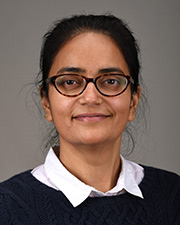
Anjali Chauhan, MSc, PhD
- Assistant Professor
- BRAINS Research Laboratory
Biography
Dr. Anjali Chauhan received her Bachelor of Pharmacy from Ram-Eesh Institute of Vocational and Technical Education in Greater Noida, India. She completed her Master of Science in Pharmacology and her PhD in Pharmacology from All India Institute of Medical Sciences in New Delhi, India.
Her current areas of research are investigating molecular mechanisms involved in ischemic stroke injury and evaluating therapies for stroke treatment. Additionally, she is also interested in exploring mechanisms that are involved in aging.
Education
- Bachelor Degree
- Pharmacy, Ram-Eesh Institute of Vocational and Technical Education, Greater Noida, India
- Master in Science
- Pharmacology, All India Institute of Medical Sciences, New Delhi, India
- Doctorate Degree
- Pharmacology, All India Institute of Medical Sciences, New Delhi, India
Areas of Interest
Clinical Interests
- Ischemic stroke and aging
Research Interests
- Molecular mechanisms involved in aging
- Mechanisms and therapeutic targets for management of ischemic stroke
During my doctoral training, I explored potential therapeutic targets for the management of ischemic stroke and found that the immunosuppressive agents, rapamycin and mycophenolate mofetil effectively ameliorated the brain damage in ischemic injury. The protection was a consequence of the reduction of inflammation and oxidative stress inducer by these agents.
Besides investigating potential therapeutics for ischemic stroke, I am exploring the contribution of peripheral immune cells in the process of aging as well as ischemic stroke. I found that with age, the spleen harbors more myeloid cells that then migrate to the site of injury and aggravate brain damage after ischemic stroke. Additionally, my other research projects focus on investigating the role of TGF-beta Activated Kinase inhibition and CD13 in acute stroke and investigating the role of GDF11 in aging and its effect on stroke outcomes in older animals.
Publications
1. Chauhan A, Moser H, McCullough LD. Sex differences in ischaemic stroke: potential cellular mechanisms. Clin Sci (Lond). 2017 Apr 1;131(7):533-552.
2. Chauhan A, Al Mamun A, Spiegel G, Harris N, Zhu L, McCullough LD. Splenectomy protects aged mice from injury after experimental stroke. Neurobiol Aging. 2018 Jan;61:102-111.
3. Chauhan A, Hudobenko J, Al Mamun A, Koellhoffer EC, Patrizz A, Ritzel RM,Ganesh BP, McCullough LD. Myeloid-specific TAK1 deletion results in reduced brain monocyte infiltration and improved outcomes after stroke. J Neuroinflammation. 2018 May 17;15(1):148.
4. Crapser J, Ritzel R, Verma R, Venna VR, Liu F, Chauhan A, Koellhoffer E, Patel A, Ricker A, Maas K, Graf J, McCullough LD. Ischemic stroke induces gut permeability and enhances bacterial translocation leading to sepsis in aged mice.Aging (Albany NY). 2016 May;8(5):1049-63.
5. Al Mamun A, Chauhan A, Yu H, Xu Y, Sharmeen R, Liu F. Interferon regulatory factor 4/5 signaling impacts on microglial activation after ischemic stroke in mice. Eur J Neurosci. 2018 Jan;47(2):140-149.